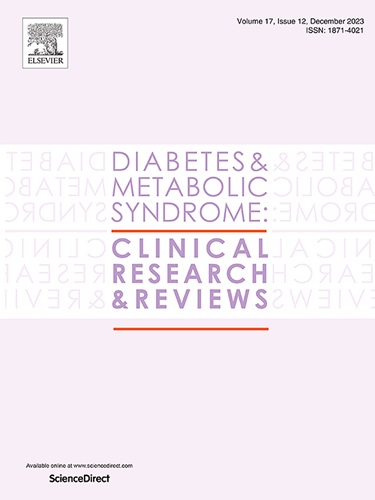多囊卵巢综合征患者碳水化合物的数量与质量:基于人群的meta分析结合GBD数据驱动评估
IF 3.4
Q1 ENDOCRINOLOGY & METABOLISM
Diabetes & Metabolic Syndrome-Clinical Research & Reviews
Pub Date : 2025-08-01
DOI:10.1016/j.dsx.2025.103277
引用次数: 0
摘要
多囊卵巢综合征(PCOS)是一种常见的代谢内分泌紊乱,与低质量碳水化合物摄入有关,尽管证据仍有争议。本研究旨在通过结合全球疾病负担(GBD) 2021数据库的全球趋势和个人数据的汇总研究,评估碳水化合物数量/质量对多囊卵巢综合征的影响。方法分析GBD 2021数据,评估多囊卵巢综合征发病率和低谷物/高糖饮料消费量的年度趋势。到2025年2月,我们检索了6个数据库,以确定基于人群的研究进行meta分析。结果表示为95% ci的平均差异(MD),并采用χ2检验和I2统计来评估异质性。结果gbd2021数据显示,随着低全谷物摄入量和高糖饮料消费量的增加,多囊卵巢综合征的发病率也在上升。这项对25项研究(n = 20,738)的荟萃分析发现,多囊卵巢综合征和非多囊卵巢综合征女性的总碳水化合物摄入量没有显著差异。然而,患有多囊卵巢综合征的女性的精粮摄入量显著增加(SMD (95% CI) = 0.66[0.09, 1.24]),全谷物摄入量(SMD (95% CI) = - 0.64[-1.34, 0.07])和纤维摄入量(MD (95% CI) = - 1.83[-3.80, 0.13])明显减少。亚组分析显示,超重(MD = - 2.92 [95% CI: 4.64至- 1.21])和非糖尿病多囊卵巢综合征女性(MD = - 1.40 [95% CI: 2.42至- 0.38])的纤维摄入量显著减少。结论与碳水化合物摄入量相比,低质量碳水化合物的摄入与多囊卵巢综合征的关系更为密切,低质量碳水化合物的摄入表现为精粮摄入较多,纤维和全谷物摄入较少。多囊卵巢综合征的不同代谢表型可能需要个性化的饮食策略。本文章由计算机程序翻译,如有差异,请以英文原文为准。
Carbohydrate Quantity vs. Quality in Polycystic Ovary Syndrome: Population-Based Meta-Analysis Combined with GBD Data-Driven Assessment
Introduction
Polycystic ovary syndrome (PCOS), a common metabolic-endocrine disorder, is linked to low-quality carbohydrate intake, though evidence remains controversial. This research aimed to evaluate carbohydrate quantity/quality impacts on PCOS by combining global trends from the Global Burden of Disease (GBD) 2021 database with pooled study from individual-level data.
Methods
We analyzed GBD 2021 data to assess annual trends in PCOS incidence and low-grain/high-sugar-sweetened beverage consumption. Six databases were searched until February 2025 to identify population-based studies for meta-analysis. Results were expressed as mean differences (MD) with 95 % CIs, and heterogeneity was evaluated using χ2 tests and I2 statistics.
Results
GBD 2021 data revealed rising PCOS incidence alongside increased low whole-grain intake and high sugar-sweetened beverage consumption. This meta-analysis of 25 studies (n = 20,738) found no significant difference in total carbohydrate intake between PCOS and non-PCOS women. However, women with PCOS had significantly higher refined grain intake (SMD (95 % CI) = 0.66 [0.09, 1.24]) and lower whole grains (SMD (95 % CI) = −0.64 [-1.34, 0.07]) and fiber intake (MD (95 % CI) = −1.83 [-3.80, 0.13]). Subgroup analyses demonstrated significantly reduced fiber intake in overweight (MD = −2.92 [95 % CI: 4.64 to −1.21]) and non-diabetic women with PCOS (MD = −1.40 [95 % CI: 2.42 to −0.38]).
Conclusion
Compared with carbohydrate quantity, lower-quality carbohydrate intake-characterized by higher refined grain consumption and lower intake of fiber and whole grains-appears to be more closely associated with PCOS. Different metabolic phenotypes in PCOS may require personalized dietary strategies.
求助全文
通过发布文献求助,成功后即可免费获取论文全文。
去求助
来源期刊

Diabetes & Metabolic Syndrome-Clinical Research & Reviews
ENDOCRINOLOGY & METABOLISM-
CiteScore
22.90
自引率
2.00%
发文量
248
审稿时长
51 days
期刊介绍:
Diabetes and Metabolic Syndrome: Clinical Research and Reviews is the official journal of DiabetesIndia. It aims to provide a global platform for healthcare professionals, diabetes educators, and other stakeholders to submit their research on diabetes care.
Types of Publications:
Diabetes and Metabolic Syndrome: Clinical Research and Reviews publishes peer-reviewed original articles, reviews, short communications, case reports, letters to the Editor, and expert comments. Reviews and mini-reviews are particularly welcomed for areas within endocrinology undergoing rapid changes.
 求助内容:
求助内容: 应助结果提醒方式:
应助结果提醒方式:


